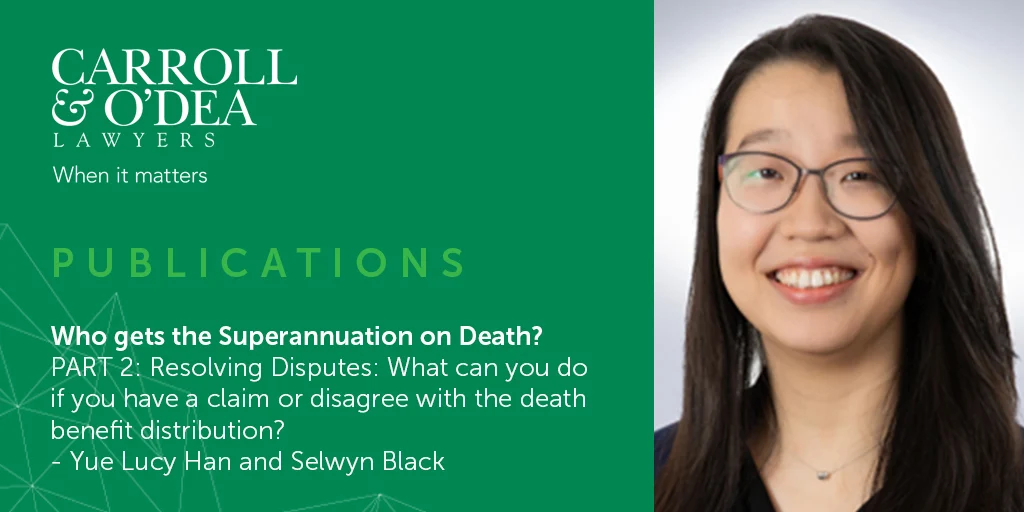
2021 Update: Who gets the Superannuation on Death? – Part 2
Published on March 9, 2021 by Selwyn Black and Yue Lucy Han
PART 2: Resolving Disputes: What can you do if you have a claim or disagree with the death benefit distribution?
Introduction
In Part One of this series Yue Lucy Han and Selwyn Black looked at how individuals can address superannuation in their Estate Planning.
It is an important issue as a considerable proportion of our wealth now sits in superannuation. It is estimated that at the age of retirement (age 60-64) the average Australian will have over $200,000 in their super fund.[1]
But what if there is a problem with the superannuation allocation after a family member or loved one has died and what can be done to make, defend and resolve claims regarding allocation of superannuation?
Resolving Disputes:
There are increasing disputes over the ownership and distribution of the superannuation balance on death. The Australian Financial Complaints Authority received 200 death benefit distribution complaints in its first 6 months of operation.[2]
Competing claims often arise between surviving family members, de facto partners, and persons who lived in a mutually supportive household.
What are the routes to resolution?
The starting point for a claimant is to urgently make a suitable claim on the super fund trustee (Trustee). If you are not satisfied with the decision that a super fund has made, the next step will be to urgently request that the Trustee review the decision.
- Super fund: Internal Review
You will need to review the rules of the specific super fund for the review procedure and requirements. Often, you may have to present supporting documents demonstration why you should be paid the death benefits or a greater proportion of the death benefits. You should request a review as soon as possible after being notified of a decision; as such requests are time-limited. The review application should set out grounds for your position, and attach applicable evidence.
- Complaint to the Australian Financial Complaints Authority
You can lodge a complaint with the Australian Financial Complaints Authority (AFCA), which has taken over the role of the previous disputes resolution body (the Superannuation Complaints Tribunal).
The AFCA will use a combination of dispute resolution strategies (both formal and informal) to help resolve the complaint, such as facilitated negotiations, conciliation, and AFCA determination.
If the AFCA is making a determination on your complaint, the AFCA will consider specific circumstances by considering the specific Trust Fund rules, the purpose of death benefits, the range of financial reliance on the deceased just before death and the deceased’s wishes, which can include non-binding nominations and wills.
For further information, you can review the detailed AFCA rules and guides on their website: https://www.afca.org.au/
- Court Intervention(a) Appealing AFCA Determination
If you are not satisfied with the AFCA determination, and you have relevant standing, you can appeal the decision to the Federal Court within 28 days of receiving a copy of the Determination.
(b) Probate or Letter of Administration and Family Provision
If not obtained, and you are eligible, you may wish to obtain a grant (or re-seal) of Probate or Letters of Administration from the court, or to seek an order for provision.
You should note that:
- Strictly, the grant of probate or letters of administration only enables the person or persons appointed to deal for or give a receipt for property in the state where the grant is made, to receive funds from the super fund on behalf of the Estate. A grant may also encourage a super fund trustee to pay to the Estate.
- For this purpose it is necessary to check which state the Trustee is based in, since a grant or re-seal of probate or letters of administration may be required in that jurisdiction.
- Obtaining a grant or re-seal of probate or letters of administration in the relevant jurisdiction may be important for superannuation, where there is no binding nomination or where the super fund trustee decides to pay the superannuation to the Legal Personal Representative (LPR). Note however that becoming Executor or Administrator can create conflicts of interest and frustrate claims if (for example) it is desired to use that position to exercise discretion under a super fund deed.
- A family provision court claim should be carefully considered if other review mechanisms do not succeed or are not applicable, and you are not suitably provided for in the will having regard to special tests and criteria applicable in the state where the super is held.
- That location may be significant because the laws of that jurisdiction, including those allowing for family provision claims by other family members, de facto spouses and defendants, may then apply and allow the other persons (despite the terms of any will or the statutory order of payments in where there is no will, for that jurisdiction), to make a “family provision” claim.
- This will be particularly significant if the superannuation trustee pays the death benefit to the LPR so that it becomes part of the estate.
- There will also be circumstances where such family provision claims can be made on the superannuation if it is part of “notional property” for the purposes of the family provision laws.
- There are critical time limits, with some limited grounds for extensions with Court approval, for making a family provision claim so legal advice should be sought promptly. You may be advised to file such a claim before the earlier processes are completed, to avoid being out of time.
As with any other areas, there are specific rules and procedures applicable to different circumstances.
We can help
We welcome enquiries if you want to plan your estate to minimise a dispute, of if you would like advice on the procedure and prospects to make or defend a claim regarding superannuation.
As with any other areas, there are specific rules and procedures applicable to different circumstances.
DECODING THE TERMS
Grant or re-seal of probate, where there is a will and named executor
Letter of administration, where there is no will
Legal Personal Representative (LPR), which can include according to the context:[2]
(a) executor of a will;
(b) administrator of the deceased estate;
(c) trustee of the estate of a person under a legal disability; and
(d) a person who holds an enduring power of attorney granted by a person;
Find out more:
Click here for Part 1 estate planning – to look at how individuals can address superannuation in their estate planning.
We welcome enquiries if you want to plan your estate to minimise a dispute, of if you would like advice on the procedure and prospects to make or defend a claim regarding superannuation. Click here to contact us.
[1] Ross Clare, Director of Research, ‘Superannuation account balances by age and gender’, ASFA Research and Resource Centre, October 2017
[2] Australian Financial Complaints Authority, Six Month Report.

